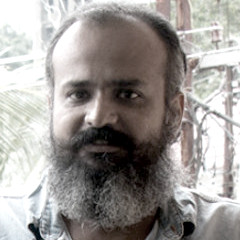Women's journeys in Christo Tomy's 'Ullozhukku' | Movie Analysis

Mail This Article
There was no better time for Christo Tomy's 'Ullozhukku', which boasts power-packed performances from Urvashi and Parvathy Thiruvothu in the lead roles, to be released than now, with Malayalam Cinema reflecting on the failure or reluctance of its top filmmakers to craft strong female characters. Christo brings unadulterated femininity to the forefront, portraying his women—primarily Leelamma (Urvashi) and her daughter-in-law Anju (Parvathy)—as human beings with raw emotions. He successfully deviates from the archetypal binary style of depicting women either as paragons of virtue or embodiments of vice, giving the film a refreshing feel.

Having said that, Christo did falter in one aspect as a writer and director (a very personal opinion). Before dissecting Christo's women characters, let's address the one treatment that stood out awkwardly in the otherwise well-crafted story flow. For most of the movie, Christo, after providing his actors with a solid screenplay, allows them space to flourish without meddling with the organic development of the story; an approach reminiscent of Mani Ratnam's strategy while directing actors like Kamal Haasan or Mohanlal. And it pays off!

However, in the third act of the movie, an abruptly ended conversation between Anju, Leelamma, and Sister Aunty leads Anju to suspect that Leelamma had hidden Thomaskutty's (Prashanth Murali) medical condition from her and her parents to facilitate the marriage. Uncharacteristically, Christo resorts to spoon-feeding viewers with flashbacks from the first act of the movie as reasons that bolster the doubts in Anju's mind. This was completely unexpected from a director who had smartly avoided cliches throughout the movie.
Read also by the author: 'Bramayugam' and 'My Dear Kuttichathan' - depicting the struggle of gods and demigods for freedom from humans

Three of the early instances from the movie that highlight the director's brilliance are the abrupt transitions employed in the opening, the send-off scene after Anju and Thomaskutty's wedding and the death of Thomaskutty. In the first one, Christo cuts from Anju and Rajeev's interaction in the garment shop, where she was showcasing wedding sarees to customers, to her marriage photoshoot with Thomaskutty. The match cut on the theme of the scene is extremely striking. In the second one, instead of the usual farewell of the bride, it is the parents of the girl who are going back home after dropping their daughter at her husband's home. This sticks in one's mind because you are conditioned by umpteen movies to expect the bride going away from her home as the natural progression in such sequences. It is the same with Thomaskutty's death scene. When he breathes his last, holding Anju's hands, instead of the usual crying of the wife or relatives, Christo focuses on the last teardrop flowing out of the dead man.
Christo's mother-in-law character, Urvashi's Leelamma, is not the typical villainous MIL but a mother who selfishly hides her son Thomaskutty's health issues to see him married. Leelamma even openly admits to 'Sister Aunty' that she was not trying to deceive Anju or her parents. Anju, alternatively, turns to romantic infidelity when her ailing husband fails to meet her emotional and physical needs. With a lovemaking scene of Anju and Thomaskutty, Christo establishes that had fate taken a different path, Anju would have lived happily with her husband. Christo takes great care to narrate the story sans melodrama, a key ingredient for directors dealing with emotionally intense subjects.

Christo tactfully plays cat and mouse with the judgmental audience who wish to take sides by introducing crucial details one after the other. After all his cards are out in the open, the director makes Leelamma and Anju sit by Thomaskutty's body and trade verbal blows, oblivious to the milieu and societal expectations in such a situation. Viewers experience a social awkwardness akin to intruding on a neighbour's family conflict but wouldn't dare to judge these women.

Christo's lead ladies know well that they are all they have. Though she despises the very existence of Anju after discovering that the father of the child she's carrying is not her son and that her daughter-in-law is only waiting for Thomaskutty's funeral to leave with the other man, Leelamma is the only one who stands with Anju in the end.

Christo crafts Anju as a practical woman, which is why she goes to Leelamma after Rajeev instructs her to ask for the farmland she once offered her. However, Anju changes her mind at the last minute, showing that she is not ready to take advantage of the old lady like Rajeev. We don't feel Anju is an opportunist when she decides to go back with her mother-in-law instead of her lover, who tells her that he is making a sacrifice by accepting a woman who slept with someone else. Instead, she attains the persona of a bold and independent woman.

When the two women sit in the country boat and begin their journey back home they are above all undercurrents and their life attains a crystal clear form. It flows like one river.


